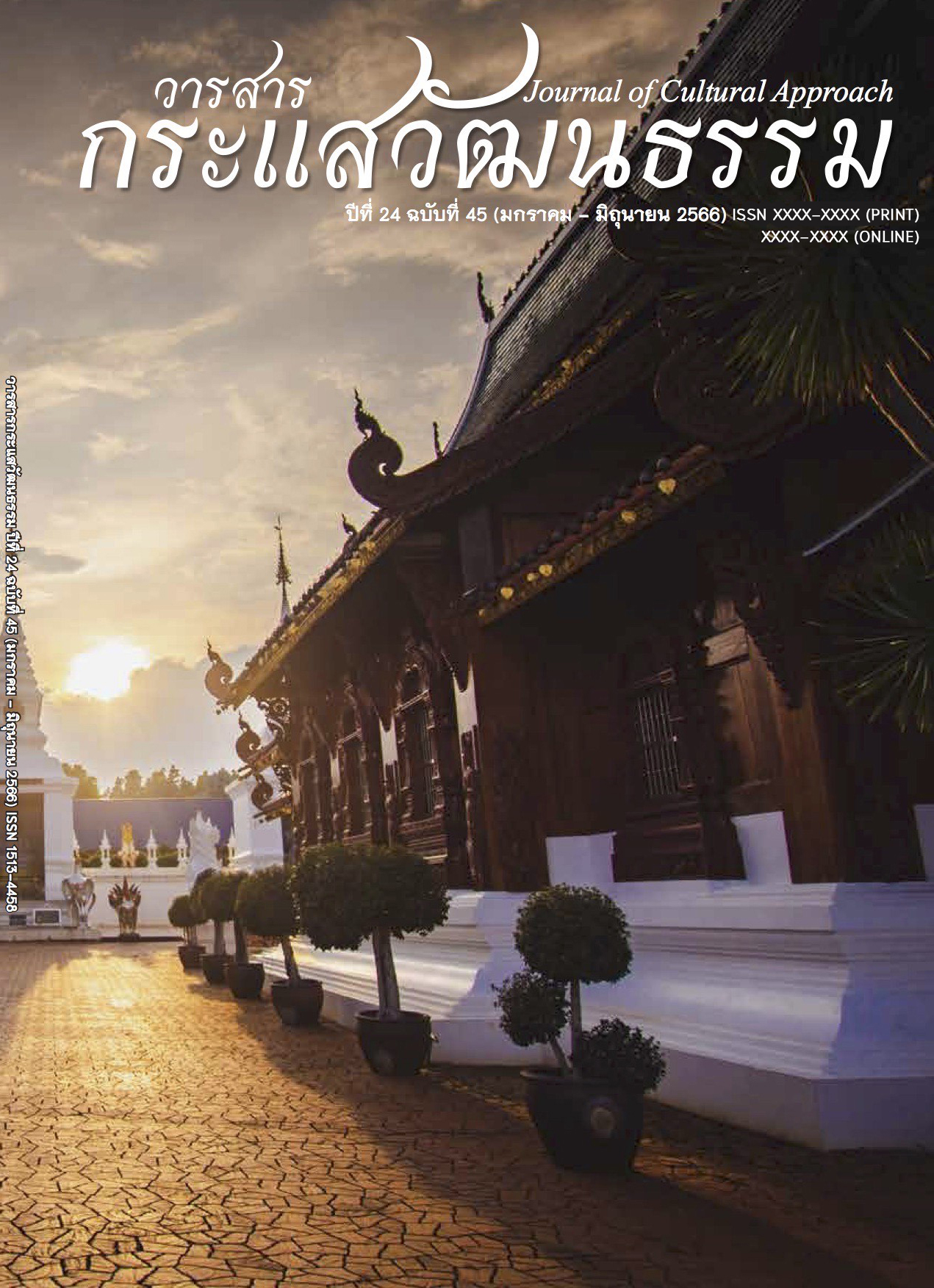การจัดการการท่องเที่ยวโดยชุมชนอย่างยั่งยืนจังหวัดระยองในยุคดิจิทัล
Main Article Content
บทคัดย่อ
การวิจัยนี้ มีวัตถุประสงค์เพื่อศึกษาการจัดการการท่องเที่ยวโดยชุมชนในจังหวัดระยอง และเพื่อเสนอการจัดการการท่องเที่ยวโดยชุมชนอย่างยั่งยืนจังหวัดระยองในยุคดิจิทัล พื้นที่ศึกษาได้แก่ ชุมชนที่จัดการการท่องเที่ยวโดยชุมชนจังหวัดระยอง จำนวน 3 ชุมชน ใช้การสัมภาษณ์แบบเจาะลึกและการสนทนากลุ่มย่อย โดยผู้ให้ข้อมูลสำคัญจำแนกออกเป็น 3 กลุ่ม คือ สมาชิกในชุมชนท่องเที่ยวจำนวน 9 คน ผู้นำและกรรมการดำเนินการของชุมชนการท่องเที่ยวจำนวน 8 คน และเจ้าหน้าที่ภาครัฐจำนวน 2 คน รวม 19 คน การศึกษาครั้งนี้เป็นวิจัยเชิงคุณภาพ ใช้วิธีการสุ่มตัวอย่างแบบเจาะจง เครื่องมือที่ใช้ในการศึกษาคือ แบบสัมภาษณ์กึ่งโครงสร้าง โดยพัฒนาจากการศึกษาจากเอกสาร บทความวิจัยและบทความวิชาการ รวมถึงการเก็บข้อมูลภาคสนาม วิเคราะห์ข้อมูลเชิงเนื้อหาและนำเสนอข้อมูลเชิงพรรณนา โดยการศึกษาครั้งนี้ได้ข้อเสนอการจัดการการท่องเที่ยวโดยชุมชนอย่างยั่งยืนจังหวัดระยองในยุคดิจิทัล 3 ด้าน ได้แก่ 1) การจัดการด้านบุคลากรทางการท่องเที่ยว 2) การจัดการด้านการตลาดดิจิทัลและการประชาสัมพันธ์การท่องเที่ยวโดยชุมชน และ 3) การจัดการด้านการบริการนักท่องเที่ยวอย่างมีคุณภาพและมีความปลอดภัย
Article Details

อนุญาตภายใต้เงื่อนไข Creative Commons Attribution-NonCommercial-NoDerivatives 4.0 International License.
Proposed Creative Commons Copyright Notices
1. Proposed Policy for Journals That Offer Open Access
Authors who publish with this journal agree to the following terms:
- Authors retain copyright and grant the journal right of first publication with the work simultaneously licensed under a Creative Commons Attribution License that allows others to share the work with an acknowledgement of the work's authorship and initial publication in this journal.
- Authors are able to enter into separate, additional contractual arrangements for the non-exclusive distribution of the journal's published version of the work (e.g., post it to an institutional repository or publish it in a book), with an acknowledgement of its initial publication in this journal.
- Authors are permitted and encouraged to post their work online (e.g., in institutional repositories or on their website) prior to and during the submission process, as it can lead to productive exchanges, as well as earlier and greater citation of published work (See The Effect of Open Access).
Proposed Policy for Journals That Offer Delayed Open Access
Authors who publish with this journal agree to the following terms:
- Authors retain copyright and grant the journal right of first publication, with the work [SPECIFY PERIOD OF TIME] after publication simultaneously licensed under a Creative Commons Attribution License that allows others to share the work with an acknowledgement of the work's authorship and initial publication in this journal.
- Authors are able to enter into separate, additional contractual arrangements for the non-exclusive distribution of the journal's published version of the work (e.g., post it to an institutional repository or publish it in a book), with an acknowledgement of its initial publication in this journal.
- Authors are permitted and encouraged to post their work online (e.g., in institutional repositories or on their website) prior to and during the submission process, as it can lead to productive exchanges, as well as earlier and greater citation of published work (See The Effect of Open Access).
เอกสารอ้างอิง
Bricker, K. S. & Schultz, J. (2011). Sustainable Tourism in the USA: A Comparative Look at the Global Sustainable Tourism Criteria. Tourism Recreation Research, 36(3), 215–229.
Butler, R. W. (1999). Sustainable Tourism: A State–of–the–Art Review. Tourism Geographies, 1(1), 7–25.
Clark, K. R. & Vealé, B. L. (2018). Strategies to Enhance Data Collection and Analysis in Qualitative Research. Radiologic Technology, 89(5), 482CT–485CT.
Daosomboon, J. (2021). Creating Value Products from Local Wisdom, Ban Mon Pottery, Ban Kaeng Sub–district, Nakhon Sawan Province under the Concept of Creative Economy. Journal of Cultural Approach, 22(42), 19–33.
Day, J. & Romanchek, J. L. (2020). Sustainable Tourism for Destinations: Insights from the GSTC Destination Criteria 2.0 for Sustainable Tourism. Purdue University.
Decrop, A. (1999). Triangulation in Qualitative Tourism Research. Tourism Management, 20(1), 157–161.
Ellul, A. (1996). Control of Tourist Development Liable to Have Significant Consequences on the Environment: National, Regional and Local Planning Policy. Sustainable Tourism Development.
Flick, U. (2004). Triangulation in Qualitative Research. A Companion to Qualitative Research, 3, 178–183.
Gentles, S. J., Charles, C., Ploeg, J. & McKibbon, K. A. (2015). Sampling in Qualitative Research: Insights from an Overview of the Methods Literature. The Qualitative Report, 20(11), 1772–1789.
Gray, B. & Wood, D. J. (1991). Collaborative Alliances: Moving from Practice to Theory. The Journal of Applied Behavioral Science, 27(1), 3–22.
Joomponpong, P., Wiphatkrut, S., Jittimanee, U. & Sookkerd, S. (2020). Digital Media Innovation to Promote Community–Based Tourism to Sustainable Way of Ban Khok Pradu Community, Sa Bot District, Lop Buri Province. Journal of Legal Entity Management and Local Innovation, 6(3), 15–27.
Kaewnuch, K. (2018). Participatory Factors for Managing Community–Based Tourism. International Thai Tourism Journal, 14(1), 110–127.
Manirochana, N. (2017). Community Based Tourism Management. International Thai Tourism Journal, 13(2), 25–46.
Mungkalarungsi, S., Raktham, A., Chirinang, P. & Fuangchan, S. (2021). Strenthening Community Based Tourism with Digital Platform. Journal of Administrative and Management Innovation, 9(1), 45–55.
Pakshir, L. & Nair, V. (2011). Sustainability of Homestay as a Form of Community–Based Tourism (CBT): A Case Study of the Rural Community in Bavanat–Iran. TEAM Journal of Hospitality and Tourism, 8(1), 5–18.
Qu, S. Q. & Dumay, J. (2011). The Qualitative Research Interview. Qualitative Research in Accounting & Management, 8(3), 238–264.
Sakdivorapong, C. (2013). Mutual Obligation According from International Conference Accelerates a Strategy of Sustainable Productivity in Thailand. Romphruek Journal, 31(1), 25–48.
Sarobol, S. (2004). Community–Based Tourism Management. Research Community, 57(10/11), 15–21.
Sricharoenpramong, S., Sankae, N., Saengkae, N. & Wiwatkitbhuwadol, N. (2021). Market Development of Local Fishery–Based Products for Tourism during the COVID–19 Outbreak in Rayong Province. The Journal of Social Communication Innovation, 9(1), 140–149.
Srigetand, U. & Ngernklay, P. (2021). Community–Based Tourism Management in Eastern Thailand. Western University Research Journal of Humanities and Social Science, 7(1), 250–262.
Srirak, C. (2022). Guidelines for Management of Creative Cultural Heritage Values for Sustainability in Supan Buri River Basin Community, Thailand. Journal of Cultural Approach, 23(44), 3–18.
Suvarnakuta, K., Jaroenroop, N. & Benchatikul, K. (2020). The Creative Agro–tourism Management in Rayong and Chanthaburi Province. Sripatum Chonburi Journal, 17(2), 22–31.
Yaemsuksawat, Y., Raksamueng, S. & Ngamsnit, S. (2019). Management of Agro–tourism in Rayong Province. Journal of MCU Social Science Review, 8(4), 136–144.


